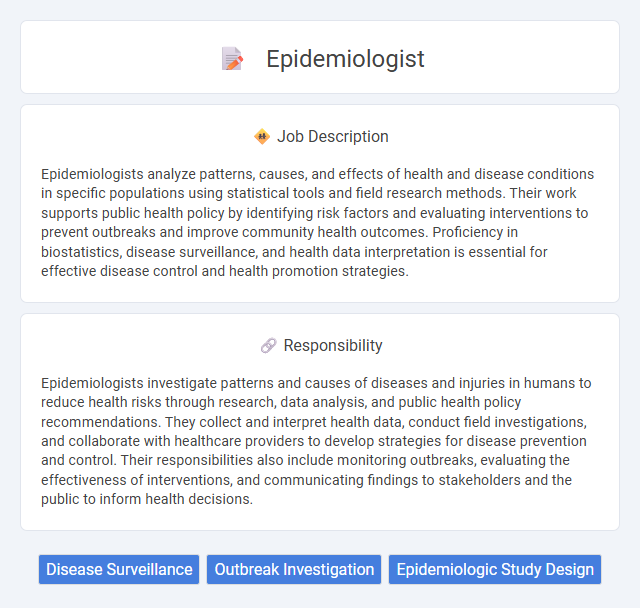
Epidemiologists analyze patterns, causes, and effects of health and disease conditions in specific populations using statistical tools and field research methods. Their work supports public health policy by identifying risk factors and evaluating interventions to prevent outbreaks and improve community health outcomes. Proficiency in biostatistics, disease surveillance, and health data interpretation is essential for effective disease control and health promotion strategies.
Individuals with strong analytical skills and a keen interest in public health are likely suitable for an epidemiologist role. Those comfortable working with data, conducting research, and addressing disease patterns may find this career aligning well with their abilities. People who prefer hands-on clinical work or less data-driven tasks might be less suited for this job.
Qualification
Epidemiologists typically require a master's degree in public health (MPH) or a related field, with strong backgrounds in biostatistics, biology, and health sciences. Proficiency in data analysis software such as SAS, R, or SPSS enhances the ability to interpret complex health data effectively. Certification from organizations like the Board of Certified Epidemiologists (BCE) can further validate expertise and improve job prospects.
Responsibility
Epidemiologists investigate patterns and causes of diseases and injuries in humans to reduce health risks through research, data analysis, and public health policy recommendations. They collect and interpret health data, conduct field investigations, and collaborate with healthcare providers to develop strategies for disease prevention and control. Their responsibilities also include monitoring outbreaks, evaluating the effectiveness of interventions, and communicating findings to stakeholders and the public to inform health decisions.
Benefit
Epidemiologists likely enjoy significant benefits such as competitive salaries and comprehensive health insurance plans. They probably have access to retirement savings options and opportunities for professional development. The role may also provide job stability and the chance to make impactful contributions to public health.
Challenge
Epidemiologists likely face challenges in accurately tracking disease outbreaks due to incomplete or delayed data, which may hinder timely public health responses. They probably encounter difficulties in controlling rapidly spreading infectious diseases amid limited resources and varying population behaviors. Balancing the need for thorough research with urgent decision-making demands could create ongoing pressure and complexity in their roles.
Career Advancement
Epidemiologists enhance public health by investigating disease patterns and causes, often advancing to roles such as senior epidemiologist, research director, or public health advisor. Career progression frequently involves gaining specialized expertise in biostatistics, infectious diseases, or chronic disease epidemiology, alongside obtaining advanced degrees like a Master of Public Health (MPH) or a PhD. Leadership positions demand strong skills in data analysis, grant writing, and interdisciplinary collaboration within governmental agencies, research institutions, or healthcare organizations.
Key Terms
Disease Surveillance
Epidemiologists specializing in disease surveillance collect and analyze data to monitor the spread and patterns of infectious diseases. They utilize statistical software and geographic information systems (GIS) to identify outbreaks and inform public health interventions. Their work supports timely decision-making to prevent disease transmission and improve population health outcomes.
Outbreak Investigation
Epidemiologists specializing in outbreak investigation analyze patterns, causes, and effects of disease outbreaks to control and prevent further spread. They utilize statistical data, field studies, and laboratory results to identify the source and transmission pathways of infectious diseases. Their expertise is crucial for developing targeted public health interventions and informing policy decisions during health emergencies.
Epidemiologic Study Design
Epidemiologists specialize in designing epidemiologic studies to investigate disease patterns, causes, and effects within populations. Key study designs include cohort, case-control, and cross-sectional studies, each providing unique methods to measure incidence, prevalence, and risk factors. Mastery of study design is essential for identifying determinants of health outcomes and guiding public health interventions.
 kuljobs.com
kuljobs.com